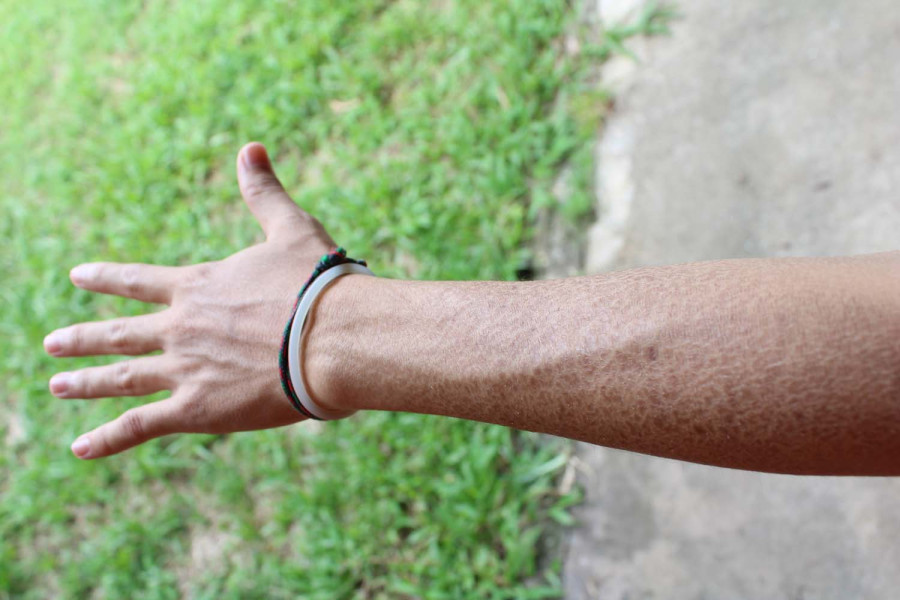Culture & Lifestyle
Insights into ichthyosis
Dr Prajwal Pudasaini discusses its symptoms, causes and management strategies.
Rukusha Giri
The manifestation of some physical and mental problems can be observed through skin disorders as well. One such rare condition is Ichthyosis, which can affect people of all ages, races, and ethnicities. It leads to dry, scaly and thickened skin, ranging from mild to severe. While it mainly affects the skin, ichthyosis can, in some cases, harm internal organs.
Dr Prajwal Pudasaini, a dermatologist at Civil Service Hospital, was honoured with the 2021 European Scholarship Award and has shared his expertise through lectures at events like the International Congress of Dermatology 2021 and the European Congress of Dermatology 2021. In this interview with the Post, Dr Pudasaini delves into ichthyosis, discussing its symptoms, causes and management strategies to shed light on this mysterious skin disorder.
What is ichthyosis?
Ichthyosis encompasses a collection of genetic skin disorders sharing common symptoms that impact the outer layer of the skin. It manifests from birth and varies in severity. While it can affect anyone, it is often inherited from parents, although new gene mutations may also lead to its occurrence in individuals without a family history. In some cases, ichthyosis can develop as a result of an underlying medical condition or medication side effects, even without a genetic predisposition.
What are its symptoms?
Ichthyosis displays visible symptoms such as dry and scaly skin, marked by the formation of thick, rough patches on the skin surface. These scales can vary in size and texture. Inflammation may cause redness and discomfort, often accompanied by itching. Skin irritation can lead to cracks, and in severe cases, ichthyosis can result in fissures that raise the risk of infection. People with ichthyosis often experience thickening of the palms of the hands and the soles of the feet. In some instances, the thickened skin can impede joint movement, making daily activities more challenging.

What causes it?
Ichthyosis is a group of inherited skin disorders caused by genetic mutations. The way it is passed down varies depending on the specific type of ichthyosis, and many gene changes have been identified. As our bodies constantly renew and shed skin, individuals with ichthyosis experience various symptoms. There are several types of ichthyosis, each with its distinct cause. One severe form is congenital ichthyosiform erythroderma (CIE), inherited as an autosomal recessive trait. This means both parents must carry the gene for their child to be affected. CIE symptoms include scaly, red skin.
There are three main types of ichthyosis, a genetic skin disorder. The first is X-linked recessive ichthyosis, caused by mutations in the steroid sulfatase (STS) gene, leading to a deficiency in the steroid sulfatase enzyme. The second is harlequin ichthyosis, a rare and severe form characterised by thick, diamond-shaped skin plates due to mutations in the ABCA12 gene. The third type is epidermolysis ichthyosis, another rare condition causing blistering at birth and progressing to scaly skin. This type is caused by mutations in either the KRT1 or KRT10 genes.
How can one treat ichthyosis?
There is no cure for ichthyosis, but there are strategies to manage its symptoms and maintain skin health. The focus is on reducing redness, scale thickness, and itching. Emollients or moisturisers can hydrate the skin, reducing scaling and dryness to ease redness. Applying topical agents to wet skin, followed by gentle baths, helps soften and remove scales. Avoiding strong soaps and hot water can prevent skin irritation. Prescription retinoid creams may reduce scaling and promote skin turnover.
For specific types and levels of ichthyosis, doctors might recommend ‘keratolytic’ topical medications to alleviate scales. However, excessive use can lead to irritation and adverse effects. It is essential to consult a physician before trying any treatment. In severe cases, oral medications like isotretinoin may be prescribed to manage symptoms. Ichthyosis is a complex and rare skin condition that poses challenges for those affected. Though there is no cure, proper management, dermatologist guidance and support from patient advocacy groups can help individuals with ichthyosis lead fulfilling lives.




 14.12°C Kathmandu
14.12°C Kathmandu















